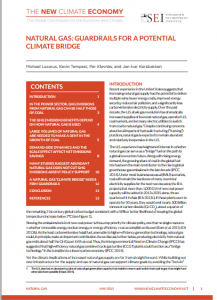Full Title: Natural Gas: Guardrails for a Potential Climate Bridge
Author(s): Michael Lazarus, Kevin Tempest, Per Klevnäs, and Jan Ivar Korsbakken
Publisher(s): The New Climate Economy and the Stockholm Environment Institute
Publication Date: May 1, 2015
Full Text: Download Resource
Description (excerpt):
Recent experience in the United States suggests that increasing natural gas supply has the potential to deliver multiple wins: lower energy costs, improved energy security, reduced air pollution, and a significantly less carbon-intensive electricity supply. Over the past decade, the U.S. shale gas revolution has dramatically increased supplies of low-cost natural gas, upended U.S. coal markets, and led many electric utilities to switch from coal to natural gas. Despite continuing concerns about local impacts of hydraulic fracturing (“fracking”) practices, natural gas is expected to remain abundant and relatively inexpensive in the U.S.
The U.S. experience has heightened interest in whether natural gas can serve as a “bridge” fuel on the path to a global low-carbon future. Along with rising energy demand, the growing share of coal in the global fuel mix has been the main contributor to the rise in global greenhouse gas emissions in the last decade (IPCC 2014). Under most business-as-usual (BAU) scenarios, coal will remain the backbone of many countries’ electricity supplies for the next two decades; the IEA projects that more than 1,000 GW of new coal power capacity will be added in 2013–2035 alone, three quarters of it in Asia (IEA 2013c). If these plants were to operate for 50 years, they would emit early 300 billion tonnes of carbon dioxide (Gt CO2), about a quarter of the remaining 21st century global carbon budget consistent with a 50% or better likelihood of keeping the global temperature increase below 2°C.
